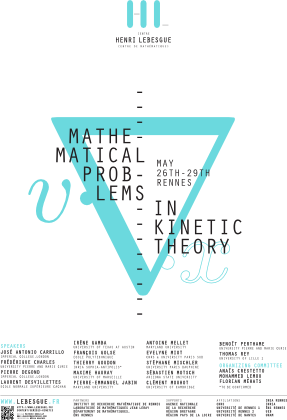
Registration is now closed.
You can find useful informations in the updated "Practical information" page.
Rennes, from May 26th to May 29th
Organization board: Anaïs Crestetto, Mohammed Lemou, Florian Méhats
Kinetic theory is an important field of research that focuses the efforts of re-known international groups coming from various scientific communities. Signifiant advances has been achieved in the last decades, covering mathematical, computational and modeling aspects, but many challenging problems still remain unsolved in this area. Application fields of kinetic theory are numerous: gases dynamics, plasmas and fusion problems, astrophysics and celestial dynamics, population dynamics, biology and cellular activity, socioeconomics and finance, etc. From the modeling point of view, the kinetic models can be thought as intermediate descriptions between fluid models (often insufficient) and particles models (too costly for a practical use). Kinetic systems are in general described by a distribution function depending on time and space but also on additional variables (velocity, character, size, etc). Most of the known kinetic models are given by equations of Boltzmann type, that may be coupled to Maxwell equations. The complexity of these models and the diversity of their structures provide a huge and extremely rich area of research for mathematical analysis, modeling and numerical simulation.
This workshop aims to present recent developments of mathematical research on the understanding of kinetic models. It will be an opportunity to bring together internationally re-known researchers and young researchers in this domain, in order to exchange the different point of views and to promote the emergence of innovative ideas.
Several questions will be investigated, including: large time behavior of kinetic equations, formal and rigorous links with N-particles systems, the development of numerical strategies that are suitable for computer simulations, as well as important modeling aspects in various application fields. Open problems will be discussed as well as new applications and research directions.
###Speakers
Marc Briant (Brown University)
Kleber Carrapatoso (ENS Cachan)
Frédérique Charles (Université Pierre et Marie Curie, Paris 6)
Young-Pil Choi (Imperial College London)
Esther Daus (Vienna University of Technology)
Pierre Degond (Imperial College London)
Laurent Desvilllettes (ENS Cachan)
Amit Einav (University of Cambridge)
Irene M. Gamba (University of Texas at Austin)
François Golse (Ecole Polytechnique)
Thierry Goudon (INRIA Sophia-Antipolis)
Maxime Hauray (Université d'Aix-Marseille)
Slim Ibrahim (University of Victoria)
Pierre-Emmanuel Jabin (University of Maryland)
Antoine Mellet (University of Maryland)
Sara Merino Aceituno (University of Cambridge)
Evelyne Miot (Université Paris-Sud 11)
Stéphane Mischler (Université Paris-Dauphine)
Sébastien Motsch (Arizona State University)
Benoît Perthame (Université Pierre et Marie Curie, Paris 6)
Thomas Rey (Université Lille 1)
Samir Salem (Aix-Marseille Université)
Maja Taskovic (The University of Texas at Austin)
